“Ripples. When you create a difference in someone’s life, you not only impact their life, you impact everyone influenced by them throughout their entire lifetime. No act is ever too small. One by one, that is how to make an ocean rise.” –Danielle Doby, Author
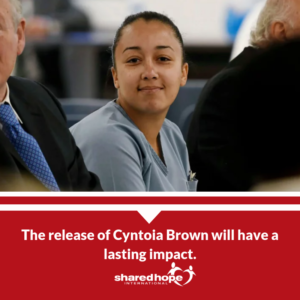
Eight months ago, we learned that Cyntoia Brown, a survivor of child sex trafficking, was
facing a potential turning point in her life story. In 2004, at 16 years old and in the throes of life experiences that no child should have, Cyntoia killed a man who had purchased her for sex. Despite overwhelming evidence of horrific childhood trauma and current exploitation, she was tried as an adult and convicted of murder. Instead of providing protection and services appropriate for Cyntoia’s trafficking victimization, the state handed her a sentence of life in prison.
Almost 15 years into her sentence, and after years of tireless cries for justice by advocates across the country, we learned that Cyntoia’s case was being considered for clemency. And so we turned to you—advocates from all walks of life—to demand justice for Cyntoia. In less than three weeks, 4,590 of you took action, signing a petition to Tennessee Governor Haslam, asking that he use his authority to grant clemency to Cyntoia. We celebrated when, on January 7th, the outgoing Governor Haslam stood on the side of justice and granted clemency to Cyntoia. And we celebrate again as we witness Cyntoia’s long-awaited release from prison today.
We celebrate this moment of justice for a survivor. We celebrate the policy advancements this specific case, and the resulting dialogues have inspired. We celebrate as we anticipate the effect Cyntoia’s case will have on other survivors of sex trafficking who may face unjust responses from the juvenile and criminal justice systems. We celebrate because we see an ocean rising.[easy-tweet tweet=”We celebrate as we anticipate the effect Cyntoia’s case will have on other survivors of sex trafficking who may face unjust responses from the juvenile and criminal justice systems.” user=”SharedHope” hashtags=”SharedHope, StoptheInjustice” url=”https://sharedhope.org/2019/08/07/how-to-make-an-ocean-rise-celebrating-cyntoia-browns-release/” template=”dark”]
When you took action, you impacted Cyntoia’s life. Resultantly, we know Cyntoia will have an extraordinary impact on her community and in this movement. The ripples from your signature, your call, your social media post will continue. Because of that, we know we have arrived at the door of critical and sustainable change.
With both immense admiration for Cyntoia’s strength and gratitude for the relentlessness of fellow advocates from across the county, we remain steadfast in our commitment to pursue justice for all survivors of sex trafficking. We invite you to join along and seek protection, not punishment, for youth who have experienced commercial sexual exploitation. Together, we can make the ocean rise.
 By Marissa Gunther, Director of Growth Strategies, Shared Hope International
By Marissa Gunther, Director of Growth Strategies, Shared Hope International
 He quickly realizes that he can’t save all of the children alone. He needs more help.
He quickly realizes that he can’t save all of the children alone. He needs more help.
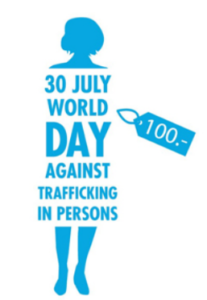 And so, we support the United Nation’s
And so, we support the United Nation’s 
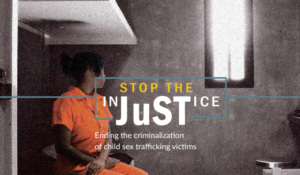 Astonishingly,
Astonishingly, 

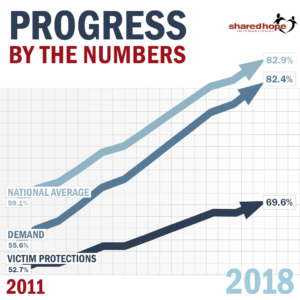



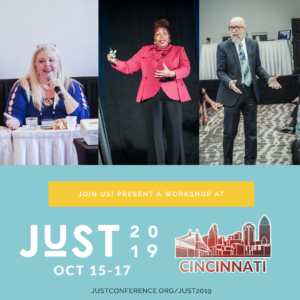 This year the 2019 JuST (Juvenile Sex Trafficking) Conference will be hosted October 15 – 17 Cincinnati, OH! In the center of Cincinnati, a few blocks from beautiful views of the Ohio river, we’ll gather anti-trafficking professionals, experts and advocates from around the country for 3 days of inspiring and empowering training.
This year the 2019 JuST (Juvenile Sex Trafficking) Conference will be hosted October 15 – 17 Cincinnati, OH! In the center of Cincinnati, a few blocks from beautiful views of the Ohio river, we’ll gather anti-trafficking professionals, experts and advocates from around the country for 3 days of inspiring and empowering training.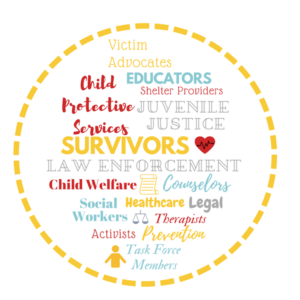 Who will be your audience?
Who will be your audience?





